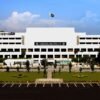ISLAMABAD: Defense Minister Khawaja Asif issued a stark warning on Tuesday, suggesting that Pakistan might conduct retaliatory strikes inside Afghanistan in response to recent terrorist incidents in Islamabad and South Waziristan. He criticized the Afghan Taliban government for allegedly harboring militants responsible for the attacks.
Over the past two days, Pakistan has faced two significant terror assaults—one targeting Cadet College Wana in South Waziristan and another in Islamabad. Asif indicated that cross-border military action against Afghanistan remains a possibility if the threat persists.Rejecting the Taliban regime’s condemnation of the attacks, Asif dismissed such remarks as insincere. “Those protected by the Afghan Taliban are repeatedly launching attacks on Pakistan,” he asserted.
He also warned India and Afghanistan against any provocative acts, emphasizing Pakistan’s readiness to respond decisively. “Pakistan will never initiate military conflict,” he clarified, but added, “We will not tolerate any act of aggression and will respond forcefully if necessary.”The Islamabad blast resulted in at least 12 fatalities and over 30 injuries, marking a significant security breach. Prior to this, Asif had warned that Pakistan is capable of delivering a strong response to cross-border terrorism.“We are in a state of war,” Asif stated in a post on X (formerly Twitter). “If anyone believes the Pakistan Army is only fighting on the border or in remote regions like Balochistan, they should see the Islamabad suicide attack as a wake-up call.”
He underscored that the fight against terrorism is a national war and that the armed forces are working tirelessly to ensure the safety and security of the nation through their sacrifices.In light of the recent attack, Asif expressed skepticism regarding the prospects of peace negotiations with the Afghan Taliban, suggesting that Kabul could end the violence if it chose to. “The Kabul leadership has the power to stop terrorism in Pakistan, but their actions indicate otherwise,” he said.
Separately, speaking to journalists in Islamabad, Asif remarked that the recent attack was likely a pressure tactic, demonstrating that militants believe they can strike anywhere in Pakistan. “The message from this attack is clear: no area is beyond their reach,” he noted.
He reaffirmed Pakistan’s stance against terrorism, vowing that the country would respond strongly to any future threats. The Islamabad suicide bombing marked the first in the capital in three years, with the previous attack occurring in December 2022.Since the Taliban’s return to power in 2021, border provinces like Balochistan and Khyber Pakhtunkhwa have experienced a surge in terrorist activity. Last month, Pakistan engaged in fierce clashes with Taliban fighters and India-backed militants along the border, resulting in the deaths of over 200 militants and retaliatory strikes.
Despite a fragile ceasefire brokered after intense fighting, negotiations have failed to produce a lasting peace agreement. Islamabad continues to press Kabul to prevent its territory from being used as a safe haven for militants involved in attacks inside Pakistan.



